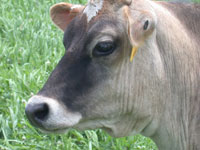UW Grazing Research Will be Featured at Wisconsin Grazing Conference

How profitable are Wisconsin dairy graziers? Are they more satisfied with their lifestyles than other dairy farmers? Do reed canarygrass and kura clover make a good pasture combination? What are the ecological effects of managed grazing? These questions and more will be addressed at the Wisconsin Grazing Conference during a special session on Friday afternoon, February 10.
Researchers from the UW-Madison received support for their work on these issues from a USDA Pasture-Based Farming grant administered by the Center for Integrated Agricultural Systems. At the Friday session, these researchers will share early results of their work and where their projects are headed.
Dick Cates, Director of the Wisconsin School for Beginning Dairy Farmers at CIAS, will provide an overview of the projects, the objectives of the Grazing Research Initiative and farmer participation in this research. This will be followed by several researchers presenting information on their work:
Tom Kriegl from the UW-Madison Center for Dairy Profitabilty and Jennifer Taylor of the Center for Integrated Agricultural Systems will discuss the economics of managed grazing and patterns of use across the state. Kriegl”s presentation will focus on the profitability of grazing farms across the Great Lakes states and in Wisconsin. Taylor will describe the impact of managed grazing on the Wisconsin dairy industry, as well as common misconceptions about graziers.
Mike Bell and Sarah Lloyd from the UW-Madison Rural Sociology Department will share what they”ve learned from focus groups about graziers” satisfaction with their lives and ability to deal with the unexpected in their farming operations. They have prepared a survey to further investigate quality of life on dairy farms.
Randy Jackson of UW-Madison Agronomy, Claudio Gratton from Entomology and Mike Bell from Rural Sociology will discuss the effects of managed grazing on pasture ecosystems. They will present findings on how plant communities and microorganisms are affected by different management strategies, and how this affects nutrient cycling. They will also discuss graziers” participation in their on-farm ecological measurements.
Ken Albrecht from the UW-Madison Agronomy Department and Dave Combs of the UW-Madison Dairy Science Department will discuss their experiences with pastures planted to reed canarygrass and kura clover. They will cover the persistence and quality of this pasture blend, as well as milk production from this combination.
This session is part of the Wisconsin Grazing Conference, which runs from February 9 through 11 at the Stevens Point Holiday Inn. The conference is put on by GrassWorks, a membership association that links farmers through local networks and provides leadership, education, and research support to promote grass-based farming. In order to avoid a $10 late fee, conference registration must be postmarked by February 3. For more information on the conference and a registration form, visit www.grassworks.org or contact Paul Nehring, GrassWorks Director, at 715-261-6009 or mail@grassworks.org.
#
author: Ruth McNair

